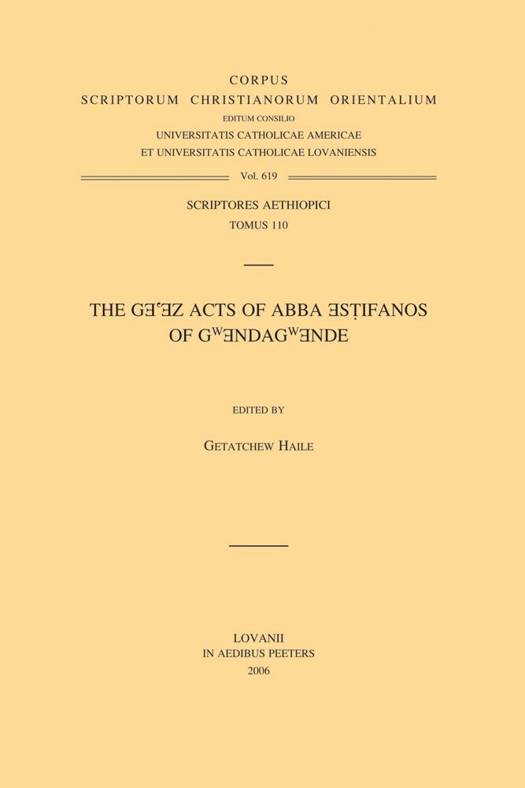
Bedankt voor het vertrouwen het afgelopen jaar! Om jou te bedanken bieden we GRATIS verzending (in België) aan op alles gedurende de hele maand januari.
- Afhalen na 1 uur in een winkel met voorraad
- In januari gratis thuislevering in België
- Ruim aanbod met 7 miljoen producten
Bedankt voor het vertrouwen het afgelopen jaar! Om jou te bedanken bieden we GRATIS verzending (in België) aan op alles gedurende de hele maand januari.
- Afhalen na 1 uur in een winkel met voorraad
- In januari gratis thuislevering in België
- Ruim aanbod met 7 miljoen producten
Zoeken
Omschrijving
Abuna Estifanos (Stephen), the edition and translation of whose hagiographical life is presented here, was the leader of a monastic reform movement that shook the foundations of the Ethiopian State and Church in the fifteenth century. Estifanos (Stephen) started his movement at the end of the reign of the king whom Emperor Yeshaq succeeded in 1413 AD. The reform movement of Estifanos and his followers, called Daqiqa Estifanos or Estifanosites or Stephanites, was known to the local clergy from the time of the reign of Emperor Zar'a Ya'eqob (1434-1468). As we know from Zar'a Ya'eqob's writings, including some miracles of Mary or Ta'ammera Maryam, the Estifanosites were at loggerheads with the monarch. The outside world first became aware of the Daqiqa Estifanos from the narratives of the Portuguese embassy that visited Ethiopia during the years 1520-1527. Since then several travelers and scholars have written about these monks. The basis of the Estifanosites reform movement was that monks should observe a strict monastic life, according to the rules laid down by the fathers of monasticism, and that the teachers of the Church should limit the doctrine of Christianity to what was found in the eighty-one canonical books of the Bible, recognized by the Ethiopian Orthodox Church, and the observance of God's Commandments found in them. As they understood it, the main commandment neglected at that time was the order to worship God alone - the Father, the Son and the Holy Spirit. They considered the segdat, "prostration to the ground," a form of worship that should not be performed in reverence even to the Holy Cross or to the icon of the Madonna and Child, and certainly not out of respect for the king and his name. We hear little about the activities of the Daqiqa Estifanos after Na'od (1494-1508). But their history is a major component of the history of the Church. Although the acts of a few of the followers of Estifanos were published decades ago, the publication of the acts of their leader, the Gadla Abuna Estifanos, has somehow had to await the present day. Coincidentally, there is at present a movement to revive and pursue the reforms of the Estifanosites, which adds importance and urgency to the publication of this Gadla.
Specificaties
Betrokkenen
- Auteur(s):
- Uitgeverij:
Inhoud
- Aantal bladzijden:
- 88
- Taal:
- Engels
- Reeks:
- Reeksnummer:
- nr. 110
Eigenschappen
- Productcode (EAN):
- 9789042917408
- Verschijningsdatum:
- 31/01/2007
- Uitvoering:
- Paperback
- Formaat:
- Trade paperback (VS)
- Afmetingen:
- 160 mm x 236 mm
- Gewicht:
- 158 g

Alleen bij Standaard Boekhandel
+ 264 punten op je klantenkaart van Standaard Boekhandel
Beoordelingen
We publiceren alleen reviews die voldoen aan de voorwaarden voor reviews. Bekijk onze voorwaarden voor reviews.









